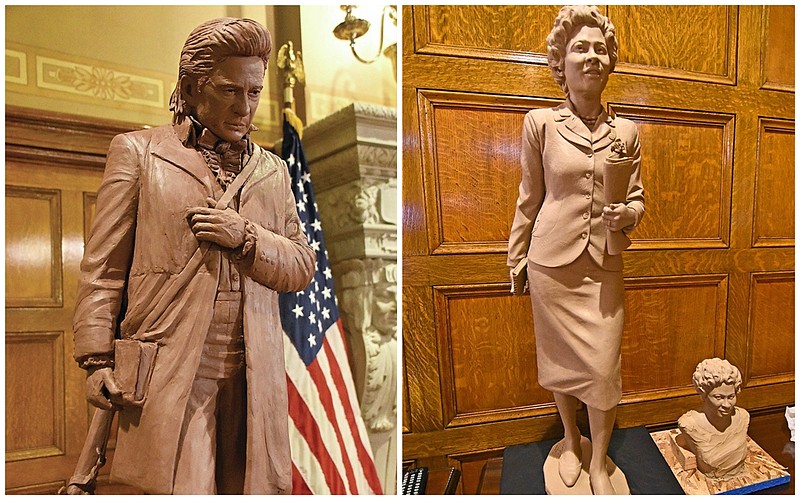The statues of civil-rights pioneer Daisy Bates and musician Johnny Cash destined for Statuary Hall inside the nation's Capitol were not completed by the end of 2022, but officials are hopeful they will be ready soon.
Shealyn Sowers, spokeswoman for the governor's office, said the official letter for sculptor Kevin Kresse's engineering packet for the Johnny Cash statue was sent last week to the architect of the Capitol and the Joint Committee on the Library.
"We just received the official letter from the Joint Committee on the Library approving Kevin Kresse's engineering packet for the Johnny Cash statue and pedestal," Sowers said late Friday. "Both statues have received their final approvals and now can go to be bronzed."
Sowers said the clay statues for each have been complete for some time. She said the process of the engineering packets and approvals took longer than state officials had hoped because of the congressional schedule, but added that hopefully everything will remain on track for installation of the statues in this year.
Kevin Niehaus, deputy secretary of state, said the Bates statue was sent to foundry for casting last month.
Kresse, of Little Rock, and fellow sculptor Benjamin Victor of Boise, Idaho, were awarded commissions in June to create the likenesses of Cash and Bates, respectively. The statues were approved under Arkansas' Act 1068 of 2019.
There was debate in the Legislature in 2019 about who would best represent the state. Some lawmakers suggested that someone like Sam Walton, founder of Arkansas-based retail giant Walmart, would be a better option, but Gov. Asa Hutchinson pushed for Cash and Bates.
"I couldn't be happier about Arkansas's choices," Kresse said in a Facebook post Saturday.
He posted a photograph of the Cash sculpture, saying he finished it two or three months ago and that after Friday's approval he would be able to take it to the foundry.
"I'm also extremely proud to be a native son of Arkansas, getting this opportunity to sculpt an Arkansas icon for the nation's Capitol," Kresse said in the post.
Bates grew up in Huttig and was a mentor to the nine students who integrated Little Rock Central High School in 1957. She and her husband, L.C. Bates, published the Arkansas State Press newspaper, which focused on civil rights and issues within the Black community. They were active in the NAACP, and Daisy Bates was the only woman to speak during the official program at the 1963 March on Washington.
Cash was born in Kingsland and grew up in the farming community of Dyess, and became one of the most successful and influential musicians of the 20th century. He helped kickstart the rock 'n' roll era with his recordings for Memphis-based Sun Records before becoming a force in country music as well as an advocate for prisoners' rights and other causes.
A documentary by Arkansas PBS will tell the story behind the sculptures of Bates and Cash. Director Nathan Willis began work on the documentary earlier this year.
Courtney Pledger, Arkansas PBS executive director and CEO, said earlier this year the film will document "a story of artistic creation, but also an unfolding human story. There are those players behind the scenes and the visionaries. There are the artists, and the human figures of Daisy Bates and Johnny Cash, and all the things they achieved in their lives and how they inspired these works of art."
The statues will replace those of attorney Uriah Rose, a secessionist, and U.S. Sen. and Gov. James P. Clarke, who advocated for white supremacy. Those statues have stood in Statuary Hall for more than a century.
Michael Harry, attorney of legislative affairs at the Arkansas secretary of state's office, told the state Capitol Arts and Grounds Commission last year that he had reached out to the Oakland and Fraternal Historic Cemetery Park in Little Rock about accepting the statues of Rose and Clarke.
"This is a very unique situation in that these statues have been on display in the U.S. Capitol for the last 100 years," Harry told the Arkansas Democrat-Gazette last year. "We, as a state, have not had this situation occur before."
CORRECTION: Musician Johnny Cash was born in Kingsland. His birthplace was incorrectly in an earlier version of this article.

